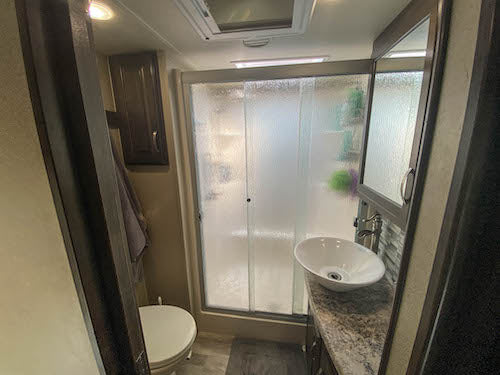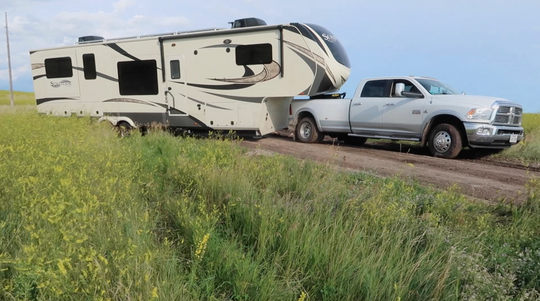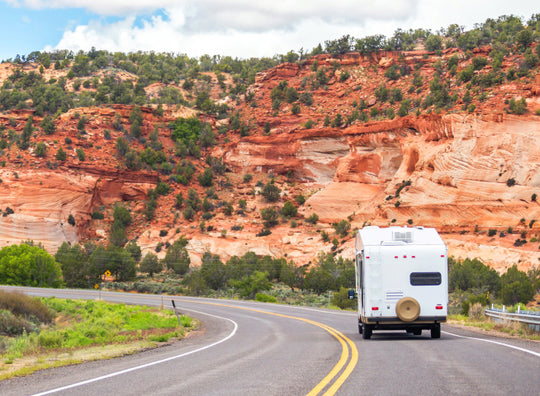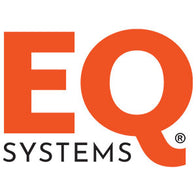Article Content
Written by the Getaway Couple Rae & Jason

Over the past three years, we’ve learned there are a lot of things to learn when it comes to RVing. While living in an RV is awesome, there can be a steep learning curve when it comes to the slew of new appliances and processes. An essential thing to understand is RV refrigerator troubleshooting and maintenance.
All refrigerators are not created equal. This is especially true in an RV where most refrigerators are quite different from their residential counterparts. Understanding the basics of how your RV refrigerator works, what critical things can go wrong, and how best to maintain your fridge can help you avoid many potential problems. Let’s review!
How Does an RV Refrigerator Work?
A typical RV refrigerator, also called an absorption refrigerator, works off of an evaporative process. Like the one in our Grand Design Solitude, most RV refrigerators can work off either propane or electricity. These types of fridges heat a combination of ammonia, hydrogen, and water; which causes evaporation. The evaporation and condensation of this process are what cool the refrigerator.
The refrigerator’s control system will automatically switch between power sources unless you override it and manually select one specific source. For instance, if you are plugged into shore power, it will operate off of electricity. When not plugged into shore power, the refrigerator will run off of LP gas.
RV Refrigerator Troubleshooting
If for any reason you’re having trouble with your RV fridge, don’t panic just yet! Walking through the below five tips should help you with troubleshooting your RV refrigerator.
1. Determine if the Refrigerator Works on Either Propane, Electric, Or Neither
The first step in troubleshooting your RV refrigerator is determining whether it works only on propane, only on electricity, or neither.
If you don’t know this information offhand, there should be an access panel on the outside of your RV where the back of the refrigerator meets the outside wall. With the access panel open, you should be able to determine if the basic operation of your refrigerator is working in the two modes. When your refrigerator is switched to propane only mode, you should see the pilot light is lit in the access compartment.

When the refrigerator is set to electric-only mode and plugged into shore power, you should be able to put your hand near the heating element (don’t touch it, or you could get burned) and feel the heat coming off of it. Knowing which source you’re having an issue with will help you determine the best course of action for repair.
2. Not Working on Electric
If the refrigerator is working on propane, but not when plugged into 120-volt shore power, you need to determine if there is power getting to the fridge. You can use a multimeter to determine this. If you are baffled by all things electrical, it’s best to have a professional or a friend that is confident in their skill with electricity do this step.

Use the multimeter to determine if there is power at the outlet in the access compartment. If there is no power at the outlet, check for any tripped circuit breakers or blown fuses at your electrical panel. If it merely a tripped breaker or a blown fuse, you may be able to reset the breaker or replace the fuse and be good to go. If the problem persists, you may want to call in a professional for further troubleshooting. If there is no power at the outlet, but all your circuit breakers and fuses are okay, again, you may want to call in a pro in to replace the outlet.

There is also the possibility that you are getting power, but the refrigerator still isn’t working. If you are getting power, but the power source is questionable, say your multimeter is reading well below 120 volts (maybe 105 or 100 or less) at the outlet, it’s possible that you simply don’t have the proper voltage to power the refrigerator. This is especially possible at a crowded RV park in the summer, when numerous people may be operating AC units and other high power appliances simultaneously.
3. Not Working on Propane: Pilot Won’t Stay Lit
When your refrigerator works off electricity, but not propane, there are a few common culprits to consider. First, it’s entirely possible that the thermocouple may be failing. If the flame lights but then goes out rather quickly, and the flue is clean, that’s a strong indicator that the thermocouple may be bad. The thermocouple is attached to the main gas valve on the back of the refrigerator. If you have strong DIY skills, you can probably replace it yourself.
This is kind of like the old saying of my computer won’t turn on and customer service asking, well, is it plugged in? But if your fridge isn’t getting a flame when on propane, the first thing to check is that you have fuel. No propane, no flame.
If your fridge is getting a flame that doesn’t go out instantly but won’t stay lit or seems relatively weak, you may have a blockage in the flue. In the outside access compartment, make sure to clean the flue, burner tube, and any openings around the flame.

4. Not Cooling Properly: RV Isn’t Level
This is one of the most common issues with RV refrigerators, and once that many people new to RVing are unaware of. An RV that isn’t level can cause problems with your refrigerator.
When you’re not level, the evaporative process isn’t as efficient or may not even work at all. This can cause sediment build-up that could make the coils overheat, which can be extremely dangerous. There are a couple of old school tricks to try if you think you have sediment build-up after having been unlevel for an extended time (which could even be just a few days).
You can carefully tap the absorber coils (not too hard, just a light tapping) with that handle of a screwdriver to try and loosen the sediment build-up. Suppose that doesn’t work, and you are a hardy DIYer. In that case, you can disconnect the power, remove your refrigerator, and set it upside down on a level surface for a few days to see if the liquids inside the cooling unit clear any blockage after it is returned to the upright position.
If neither of these works, you might require professional repairs.
5. Smell of Ammonia
A scent of ammonia around your RV fridge likely means you have a cooling unit leak. Yellow residue in or around your fridge is a strong indicator of this. If you have a cooling unit leak, you’ll need to replace the cooling unit or the refrigerator.
Tips to Keep Your RV Refrigerator Working Properly
Keep RV Level, Even When Not In Use
Keeping your rig level is key to keeping your RV refrigerator working correctly. Most manufacturers say you don’t have to be perfectly level, but you’ll want to be within about 3 degrees of the level to avoid issues. There are many additional reasons to keep your RV level, which you can read about here.
Keep Flue Clean
Even if your RV refrigerator is working correctly, you’ll want to learn how to keep the flue and burner tube clean. If you make this part of your regular maintenance, you’ll significantly reduce the odds of having burner issues.
Maximize Airflow Behind Fridge
Make sure there are no blockages around the vent at the top and back of the refrigerator. If there is a vent fan, make sure it’s working. If there isn’t a fan, installing one can help keep your fridge from working as hard, thus operating more smoothly.

Conclusion
As you can see, an RV refrigerator is a whole different animal from what you might have been used to in a home. But simply understanding how your RV’s fridge works and what can go wrong, you can avoid many of the pitfalls that come with a lack of knowledge. Armed with some basic RV refrigerator troubleshooting and maintenance skills, you’ll significantly increase your peace of mind and enhance your travels, and hopefully avoid some hefty repair bills!












